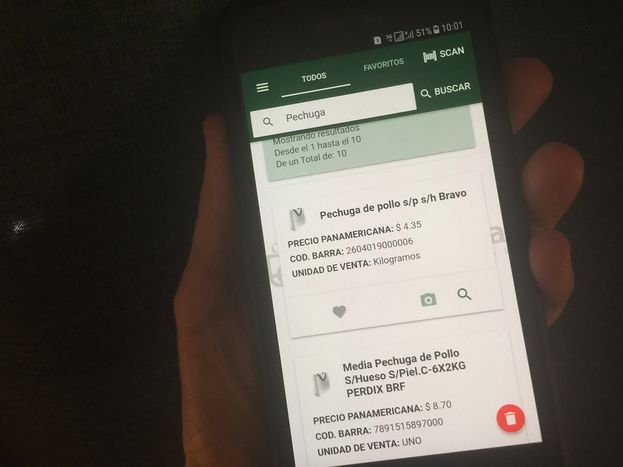
![]() 14ymedio, Yoani Sanchez, Havana, 7 July 2018 — In the shade of a busy Havana colonnade the young man pulls out his cellphone and types in the word “milk” in search of this basic food in the nearest markets. The new app for Android, “Dónde Hay” (Where is…?) promises to find any product in the network of retail stores. But this 28-year-old Cuban suspects it will not be as easy as a simple click.
14ymedio, Yoani Sanchez, Havana, 7 July 2018 — In the shade of a busy Havana colonnade the young man pulls out his cellphone and types in the word “milk” in search of this basic food in the nearest markets. The new app for Android, “Dónde Hay” (Where is…?) promises to find any product in the network of retail stores. But this 28-year-old Cuban suspects it will not be as easy as a simple click.
With shortages worsening and the coming of summer – when the consumption of food and cleaning supplies increases – the use of this new tool created by the state-owned Grupo Empresarial Cimex has spread. The utility, launched in May, aroused hope among those who must devote several hours each day to searching for something in national markets.
Among the advantages of Dónde Hay worth mentioning is that you can access the service not only through a mobile phone connected to the Internet, but also from the mobile data network of the Telecommunications Company (Etecsa), the same infrastructure used to check Nauta email accounts on cell phones. So, its offline functionality helped many decided to try it.
“This is what we needed,” “the end of the walk from store to store,” “how great they’ve done something to make things easier for people,” “why did it take so long to create something like this and when they had already created so many political apps,” were some of the comments that could be heard on the streets of the Cuban capital any time the Dónde Hay app came up.
Even those who do not know much about technology, or those who have a clear animosity toward everything composed of circuits and microprocessors, were willing to learn the rudiments of how to use a touch screen to find everything from floor cloths, to fruit compote for children or disposable diapers intended for the elderly. But the illusions were short-lived.
In less than two months of use, the Cimex app has earned a lousy reputation for misinforming customers, insisting that some product is available in certain stores where it actually ran out days ago or, as expected, was shipwrecked in the intricacies of the corruption and diversion (i.e. theft) of resources that characterize the state retail network.
Magdalena, a 56-year-old pharmacist in Havana, showed up at the doors of the Ultra market, on Reina Street, after several days of looking for chicken breasts. Magdalena’s mother is convalescing and doctors have recommended eating mashed potatoes and lean meats. “It is difficult to maintain a supply because the chicken quarters they are selling have a lot of fat,” she laments.

So Magdalena, helped by teenagers who live on the ground floor of her building, entered the word “breast” in the app. Afterwards, she had to choose between several variations, with or without skin, with or without bone, until she could focus more on the search and opt for packages of one kilogram, discarding the boxes with more portions. She was as happy as a clam.
“This is the one I want,” she pointed, looking through a small magnifying glass at the name of the product. Then, the magic was done and a list came up of all the places in the municipalities of Plaza, Playa, Centro Habana, Cerro and La Habana Vieja where they were selling the food that her mother needs. Even so, Magdalena ran into three problems.
The Dónde Hay only includes a map so that the user knows the market’s address, but it does not include a phone number so the user can call and confirm if the product is still for sale. So the busy pharmacist had to look for a telephone directory, write the number with a pen on the palm of her hand and start calling to inquire about the breasts.
Then she ran into the second obstacle. No one answered the phone in the Ultra store, a very common practice in shops and state offices. So, afraid that if she continued to delay the store would run out, she decided – under the burning July sun – to head over to the store. In her hand, like a talisman, her mobile phone kept assuring her that there were at least 70 packages of that chicken part on offer.
But Magdalena failed to notice something important. The date of the update of the information she had read was one day earlier, a characteristic of the Dónde Hay app. The database can have a delay of up to 72 hours caused by the time between the supply of information by store managers and the processing of the data, until it finally reaches the customer.
As Magdalena searched the empty refrigerators, all she got from the clerk, when she asked her why there was no chicken breasts after the app on her cellphone said there were tons, was a roar of laughter and the phrase, “but you didn’t believe that, did you?”
That morning, the beleaguered pharmacist completely lost her confidence in technology and a bit later she deleted Donde Hay, because she prefers to “walk all over Havana” searching with her own eyes versus being guided “by a lie.”
Other unfortunate users have experienced similar situations. Products that appear as if they are for sale but when the customer gets to the store they are informed that “it ran out” and was “taken off the list” or that they sold out in less than 24 hours, like a small kiosk on a little-traveled street that sold 90 bottles of mayonnaise.
“Compañero, we haven’t had acrylic paint here for years,” snapped a salesclerk to the disappointed customer who had seen on Donde Hay that exactly what he needed to finish touching up his window grille was for sale just a few blocks from his house. “None of that is true,” insisted the employee who was stacking the empty boxes behind the counter.
“You believe this chaos can be inventoried, huh?” was the last thing the customer heard before turning his back, pausing for a few seconds in the shade, and typing the word “paint” again and mentally noting the next address where it might be for sale. It was like one of those cellphone games, in the new location he could expect the reward of finding the desired enamel or the frustration of “no hay” (there isn’t any).
______________________
The 14ymedio team is committed to serious journalism that reflects the reality of deep Cuba. Thank you for joining us on this long road. We invite you to continue supporting us, but this time by becoming a member of 14ymedio. Together we can continue to transform journalism in Cuba.;
